Tag: patients
When Margo Crowther of Fort Myers, FL, was looking to add a new addition to her string of barrel racing horses, she made one very important phone call. That first call was to Palm Beach Equine Clinic (PBEC). Dr. Weston Davis, board-certified surgeon and veterinarian at PBEC, has been working with Crowther for several years and has helped maintain her horses and even performed some career-saving procedures.
In 2016, Dr. Davis helped Crowther and her 2012 Quarter Horse mare Shes Packin Fame or “Sissy” return to the ring after what could have been a detrimental injury. Sissy suffered a rare slab fracture to the central tarsal bone in her left hock while competing in a barrel racing competition. After a diagnosis aided by PBEC’s state-of-the-art diagnostic imaging equipment and a surgery performed by Dr. Davis, Shes Packin Fame not only returned to running barrels, but the five-year-old mare was also back to winning the next year. Click here to learn more about Sissy!
Crowther Meets “Mater”
This time, Crowther turned to Dr. Davis to ensure that her intended purchase of a new horse was a good fit. When she met Grandiose Guy, known to her as “Mater,” she had to have him. The Quarter Horse gelding was named the Barrel Futurities of America (BFA) Horse of the Year just after she purchased him in 2017, crowning him the top four-year-old in the country.
“When I was thinking about buying him, I called Dr. Davis and sent him videos of the horse working to review,” said Crowther, who started the purchase process late last year. “The horse was in Georgia, so he reviewed them from PBEC in Wellington and gave me the stamp of approval. Once a pre-purchase was performed, I sent all the x-rays to Dr. Davis and he told me to move forward.
“I trust Dr. Davis and the team at PBEC so much!” continued Crowther. “Barrel horses work hard and it’s so important to have a great relationship with the veterinarian who oversees their care and knows them well in order to keep them happy and healthy.”
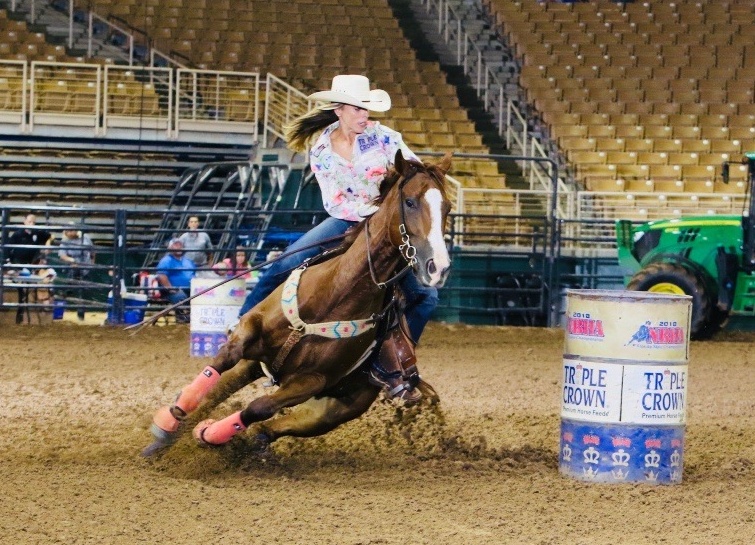
Crowther purchased Mater and started running him at the start of 2018, bringing him to the largest one-day rodeo, The American, in the Dallas Cowboys stadium in Texas in February. The competition had a $1 million payout and Mater and Crowther placed fifth.
“After so many runs, we brought him home from Texas and got him over to Dr. Davis for any maintenance work that needed to be done to keep him feeling his best,” said Crowther. “I am very picky about where I take my horses; there has to be good ground and I will not run their legs off. In conjunction with that, maintenance work with Dr. Davis is important. He performs flexion tests, utilizes the imaging at PBEC if necessary, and makes recommendations about my horses’ health and overall well-being.”
Dr. Davis sent Mater home from PBEC with a clean bill of health and Crowther gave the gelding a little time off before their next run. After returning to work, Mater headed to the National Barrel Horse Association (NBHA) Florida State Championships in Kissimmee in mid-June.
Success for Crowther and Mater
Crowther’s diligence and Dr. Davis’ knowledge paid off in full when Mater won both his runs and clinched the open final at NBHA Florida State Championships. With more than 700 entries, Mater and Crowther topped them all and were crowned overall champions of the event.

“PBEC and Dr. Davis have been a huge part of the success I have had with all of my horses,” said Crowther. “They are always there when I need them, whether I’m headed to the clinic or they are coming to me in Fort Meyers. It’s nice to be able to know your vet will be there for you whenever you need them.”
When Grand Prix dressage rider Meagan Davis needs to make sure her horses are feeling their best, she turns to Palm Beach Equine Clinic, located in the heart of Wellington, FL. Palm Beach Equine Clinic has invested more than 30 years and the work of talented veterinarians in evolving the most advanced diagnostic imaging, surgical skills, alternative therapies, and overall care of sport horses across varying disciplines.
Meagan Davis Dressage, based in Loxahatchee, FL, and Stone Ridge, NY, has entrusted Palm Beach Equine Clinic with the care and maintenance of their string of dressage horses for nearly a decade. Drawn to the personalized care provided by Palm Beach Equine Clinic’s team of veterinarians, which includes six boarded specialists, head trainer Davis was immediately comfortable turning to the clinic for the care of her horses.
“Palm Beach Equine Clinic is the premier facility in South Florida,” said Davis, 28, who has been traveling to Florida to compete at events that include the prestigious Adequan® Global Dressage Festival since she was 18 years old. “If I am going to have a horse undergo any kind of surgery or maintenance work, I will choose Palm Beach Equine Clinic every time without a doubt.
“Knowing that I can compete well in a CDI because my horse is feeling his best gives me valuable peace of mind,” said Davis. “Being that we have a couple of older horses, maintenance is huge in keeping their longevity. We have a 19-year-old horse who could go out and compete fourth level tomorrow because he is so well cared for by our vets. For my younger horses, it’s about keeping them feeling their best so their careers are as long as these older horses we have.”
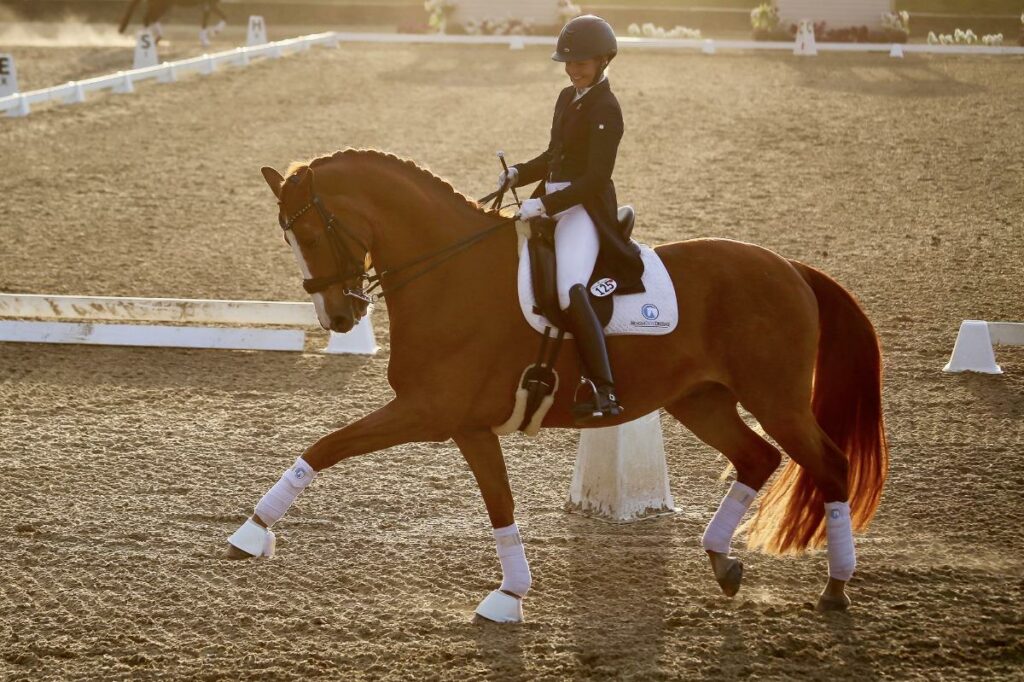
A Quick Look at Meagan Davis Dressage
Davis herself competed internationally for the first time at age 11 in the FEI Pony Division at the America’s Cup in Blainville, Quebec, while riding under the tutelage of U.S. dressage rider Lendon Gray. The appearance earned her the distinction of being the youngest rider to represent the United States in international dressage competition. She won the USEF National Young Rider Dressage Championship in 2010 and went on to compete at the Young Rider World Cup in Frankfurt, Germany, that same year. There, Davis earned a title as the only U.S. rider to finish in the “A” final, where she was seventh.
Davis later rode under the direction of 2004 Olympic and 2006 FEI World Equestrian Games team gold medalist Hubertus Schmidt of Germany before launching her own business at the end of her junior career.
“I built the business up from there,” said Davis. “I got a couple low level green broke horses to start and continued their education up through the levels. Clients started to see us at shows and were coming to me.
“When I turned 21, I started to bring clients down to Florida with me,” continued Davis, who runs her boarding and training operation out of a Loxahatchee farm owned by her parents, Bill and Karen Davis.
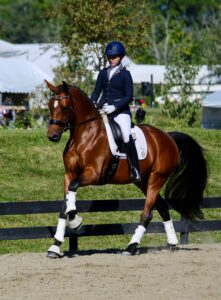
Davis currently oversees the care and training of 14 horses ranging in age from three to 23. Her own mount Royale, owned by longtime client Scott Durkin of New York, NY, is currently competing in the small tour division and contested five CDI events during the 2018 winter season. Davis is also currently producing a young horse, Damocles HLF, which her father found at an auction in Orlando. At only eight, the gelding is competing in the Developing Prix St. Georges ranks.
Davis also has a three-year-old gelding she is starting herself for Durkin, as well as clients competing at second and third level. There is even a dressage pony rounding out the string!
Trusting Palm Beach Equine Clinic
For Davis, the correct maintenance of the horses under her supervision is the cornerstone of her training program.
Palm Beach Equine Clinic’s own Dr. Robert Brusie, who graduated from Michigan State University College of Veterinary Medicine and is a board-certified surgeon, pays a visit to Meagan Davis Dressage when they arrive at their southern base each November. Giving all the horses a comprehensive exam, Dr. Brusie evaluates the needs of each individual horse to keep them fit and happy during the show season.
“He does a full work-up – flexions, injections, x-rays if needed,” said Davis. “There was a time when we weren’t doing these checks and what would happen is we would get going and I would find that something didn’t feel right and we would be missing shows during the season.”
Dr. Brusie is also responsible for vetting the majority of Davis’ horses. One, in particular, was a 14-year-old Westphalian who had a late flying change.

“We discussed how the flying change was so late and if we would ever be able to fix that situation,” said Davis. “Dr. Brusie watched the horse go, I schooled the flying changes for him, we did the vetting, and he said, ‘You’ll have this change no problem.’ He gave me what he thought would be a good program for maintenance and muscle building and the next year we had changes. I competed him through fourth level.”
When the Unexpected Happens
Every horse owner knows that when it comes to a horse’s health, the unexpected is always a looming possibility. For Davis, however, the anxiety of caring for top level sport horses is slightly assuaged by having PBEC in her corner.
“We have a Friesian who was losing weight with no clear reason why,” said Davis. “I was referred to Dr. Heidmann, who was able to correctly diagnose a colon ulcer over the phone after listening to his symptoms. He told me exactly what to do and the horse was almost magically better!”
Dr. Peter Heidmann is the PBEC resident internal medicine specialist and rounds out a diverse group of veterinarians and specialists who provide comprehensive diagnostic and treatment care.
“It’s nice that they have such a wide variety of vets on staff,” continued Davis. “We have used their MRI machine to help diagnose a torn check ligament on a horse that has since made a full recovery and is back to work, we have had them quickly assess a minor colic that had the potential to be very serious, and we have had PBEC vets here for everything from gelding stallions to teeth floating.”
With the care of her horses always at its best, Davis has big plans for her clients and herself, saying, “I hope to move Royale up to the Grand Prix level in the next year, and I would love to qualify Damocles for the USEF Young & Developing Horse Dressage National Championships. As for the clients, they will all be qualifying for regionals, which is a big deal for adult amateurs at second level. It’s all made possible because Palm Beach Equine Clinic keeps all of our horses feeling their best.”
Have further questions about the services available at Palm Beach Equine Clinic? Call the clinic today at 561-793-1599 to learn more.
Any horse owner’s worst nightmare is realized when their mount begins to show the dreaded signs of colic. For Jody Stoudenmier, a Wellington, FL, resident and avid dressage rider, she knows the symptoms all too well.

Patient History
Stoudenmier owns an 11-year-old American-bred Dutch Warmblood mare that joined her string of horses at the end of 2016 and has competed through the Intermediate II level. Sidelined by a suspensory injury last year, Beatrix was prescribed stall rest to aid in her recovery by Dr. Robert Scott of Scott Equine Services based in Ft. Lauderdale, FL. An unfortunate but common side effect of the necessary stall rest was colic. Beatrix suffered from six bouts of colic that were resolved without surgery when Dr. Scott referred Stoudenmier and Beatrix to Palm Beach Equine Clinic.
“She is such a wonderful mare; a nice mover, very athletic, sweet, sensitive, and easy to handle in the barn,” said Stoudenmier of the mare that regularly competes at the Adequan Global Dressage Festival during the winter season. “When she was recovering from her injury we tried everything to prevent her from colicking – diet, medications, hand walking – but, nothing seemed to be working.”
It was then that Palm Beach Equine Clinic’s board-certified surgeon, Dr. Weston Davis, suggested a laparoscopic surgical approach.
“Her colic had never progressed so far that we needed to do surgery before,” explained Stoudenmier. “But, at that point, I was open to anything! After speaking with Dr. Davis, I immediately had a positive feeling about it.”
Dr. Davis’ Surgical Procedure
The procedure that Dr. Davis suggested was an endoscopic ablation of nephrosplenic space. In layman’s terms, as a result of Beatrix’s colic, her colon was essentially getting caught or entrapped over the nephrosplenic ligament, which connects the left kidney to the spleen. When the colon is entrapped in this position, its contents cannot move through it and the colon becomes distended, causing the horse considerable pain, and the inevitable colic.
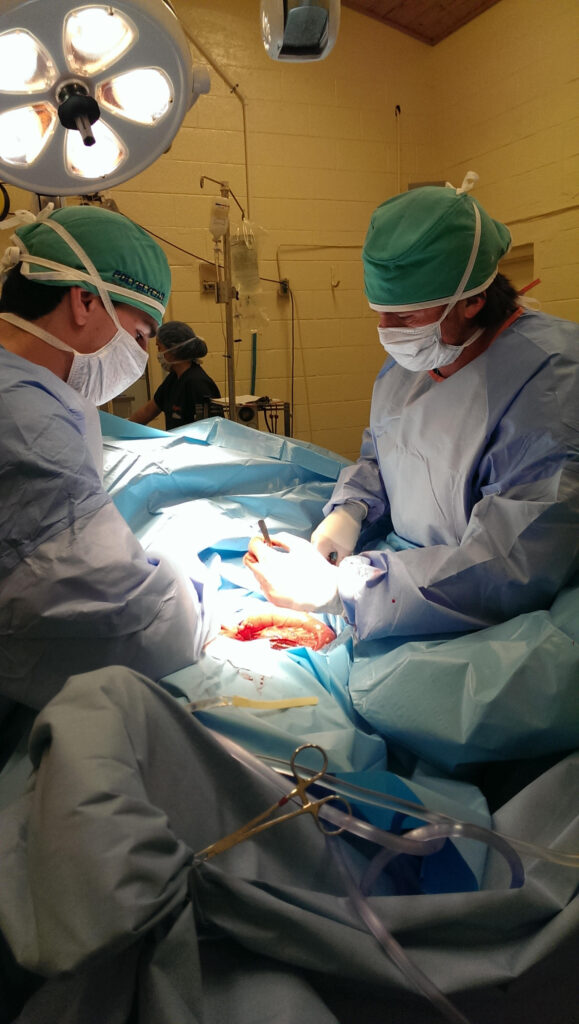
Dr. Davis’ solution was to close or perform an ablation of the nephrosplenic space to prevent further entrapment. The procedure can be conducted endoscopically where the horse does not have to be anesthetized, but undergoes a standing surgery with sedation and local anesthesia. A small incision is made in the left flank and the laparoscope is inserted through a smaller incision close by. The nephrosplenic space is then sutured closed so that the trough that forms the space between the kidney and spleen is obliterated and can no longer entrap the colon.
On October 9, 2017, Beatrix underwent a successful ablation of the nephrosplenic space at the hands of Dr. Davis.
“In the past, I have had several horses undergo surgery where they had to be anesthetized and it was very difficult to get them standing again after surgery,” said Stoudenmier. “We did not have that worry with Beatrix and the approach absolutely made a difference in her recovery.”
Post-Surgery Care and Recovery
Beatrix remained at Palm Beach Equine Clinic for a week and a half after surgery to jump-start her recovery before returning home to Stoudenmier, who has managed her post-surgery care with the help of both Dr. Davis and Dr. Scott.
“Dr. Davis was absolutely wonderful to work with,” said Stoudenmier of her experience at Palm Beach Equine Clinic. “He listened to my concerns, was patient, and kept his mind open.”
Dr. Davis paid a visit to Beatrix in mid-November to perform an ultrasound and together with Dr. Scott approved the mare to return to work. Stoudenmier has begun to introduce trot work into Beatrix’s routine and is optimistically expecting a full recovery, saying, “She looks super and everything looks good for the next two months. My goal by the end of the season is to get her back in the show ring!”
Success Story: Freeman
In January 2016, the Pine Hollow team noticed something seemed off just before driving out of the Winter Equestrian Festival (WEF) with their horses. Stopping to check the horses before continuing off the showgrounds, Pine Hollow discovered Freeman, a promising and successful Dutch Warmblood, had swung his hind leg over the back of the trailer. Freeman’s stifle had ended up squarely on one of the hooks used to secure the back door, lodging the hook into his stifle and into the femoropatellar joint.
Emergency Veterinary Care
Recognizing the extreme peril facing Freeman, Pine Hollow immediately called for help from Palm Beach Equine Clinic, the Official Veterinarians of WEF.
“It took tremendous effort, creative thinking, and exceptional teamwork to free Freeman from the hook impaling his leg,” said David Blake, Pine Hollow’s internationally acclaimed rider and trainer. “Palm Beach Equine Clinic sent several of their top vets to help us rescue Freeman. The team of vets is truly great.”
Thanks in very large part to the help and determination of the vets, Pine Hollow and Palm Beach Equine Clinic were able to free Freeman from the trailer door.
At the Equine Hospital
From there, Freeman was transported to the nearby Equine Hospital, where he spent a few days recovering before it was agreed to pursue arthroscopic surgery on his femoropatellar joint.
“To be honest, it wasn’t looking good at all for the first day or so Freeman was there,” said Blake. “The joint was so severely damaged we didn’t know if it could be fixed. Our only chance of fixing the joint was surgery, so we agreed we would try everything possible.”
Dr. Weston Davis performed the surgery, after which Freeman remained in Palm Beach Equine Clinic’s care while he regained use of the leg.
“The team did a fantastic job there and kept Freeman until he was ready to begin long-term rehab with James Keogh,” said Blake.
When Freeman was finally ready to return home to Pine Hollow, Blake hoped at best Freeman would eventually be able to do light work and perform at a low level.
Success Story: Rescue Pony Amazing Grace
On the morning of December 30, 2015, Laurie Waggoner, director of rescue operations and founder of the South Florida SPCA, got a call that she gets all too often. Agriculture patrol had received reports of three emaciated horses in Miami Gardens, FL, that needed immediate care. Waggoner took action and hooked up her truck and trailer to make the drive to pick up the three horses. When she arrived, she found an Arabian and a Quarter Horse, both severely underweight, and a pony she estimated to be two years old laying in the mud, too weak and malnourished to even stand.
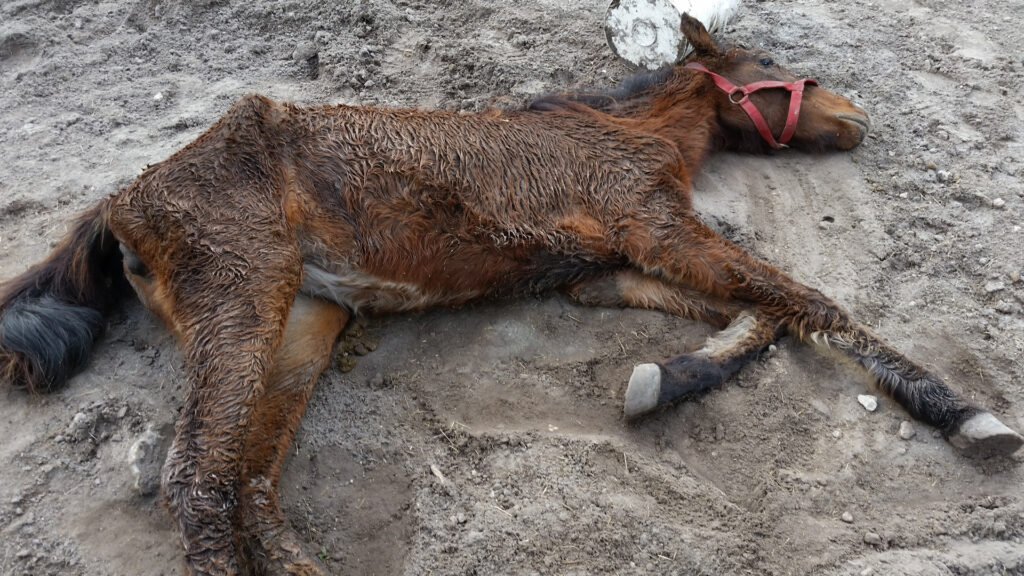
The pony, who was quickly named Amazing Grace or “Grace” had been down for more than 24 hours. Despite Waggoner’s best efforts, her team was unable to get Grace on her feet and decided the most humane option was to end Grace’s suffering. Calls went out to local veterinarians, but were met with a slow response the day before New Year’s Eve. While they waited for a veterinarian to become available, Waggoner and her team rolled Grace onto a blanket and carried her onto a trailer to make the trip back to the South Florida SPCA.
“When we pulled her off the trailer, she immediately started grazing,” said Waggoner. “The vet was on the way to euthanize her, but I saw that there was fight still left in her. We were able to pick her up and she stood with help. She was not ready to go.” Grace was made comfortable in a stall at the South Florida SPCA and stood with assistance over the next day. But, on the second day, she was no longer willing or able to make an effort to stand.

“I knew we were going to need help, but it was a holiday and locally everything was closed,” said Waggoner. “I called Palm Beach Equine Clinic (PBEC) and they told me to bring her right in.” Grace arrived at PBEC on New Year’s Day and was greeted by a team of veterinarians led by Dr. Scott Swerdlin, president of PBEC. She was treated for extreme starvation and neglect, which included constant blood work to monitor organ function, the administration of fluids, several meals of senior feed and alfalfa each day, and a lot of compassion from PBEC veterinarians.
Watch Amazing Grace’s Full Story
“She spent eight days at PBEC and returned to the South Florida SPCA ranch with the same will to live,” said Waggoner. “Five days later, I came out in the morning and she was standing on her own.” Grace was completely rehabbed in four months and put up for adoption at the end of 2016. On December 31, 2016, one year after she was found on the brink of death, Grace made her way across the U.S.-Canadian border to her new home at Sherwood Farm in St. Catharines, Ontario, with adopter Marilyn Lee.

“I knew she would need special handling to give her the chance to succeed, which we were fully prepared to do,” said Lee, who also adopted a Thoroughbred from the South Florida SPCA in 2012. “I saw her current photo on South Florida SPCA’s Facebook page and thought, ‘Now there is a lovely pony’. Then I saw the photo of her laying in the dirt, and that was that.” One of Lee’s young riders, Abby Banis, had also learned of Grace’s story on social media and was waiting for the pony in the early morning hours the day she arrived at Sherwood Farm.
The two have been inseparable ever since. Grace’s training began immediately under the direction of Lee’s daughter, Robin Hannah-Carlton. Impressed by the pony’s love for jumping, Lee made plans to start showing Grace. The rescue pony won a reserve championship in the pony hunter division at the very first show she competed in with Banis in the irons.
Today, Grace is happy and healthy with the care of Lee and her staff, and the love of a little girl. The South Florida SPCA operates under the motto, “Your next champion just might be a rescue”, and for Grace, nothing could be closer to the truth.
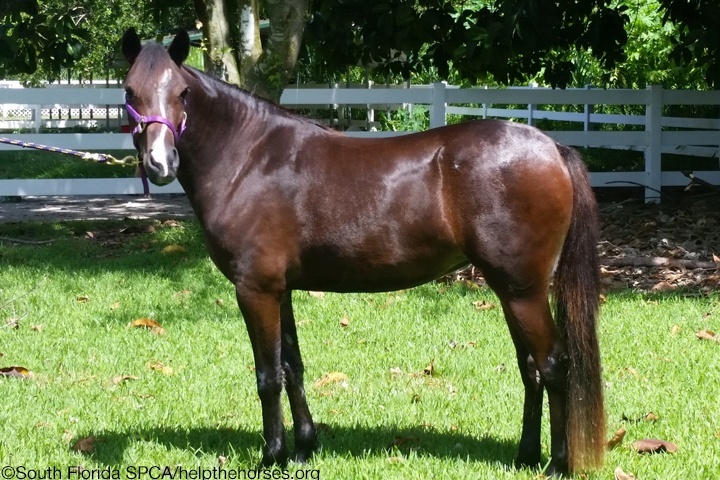
Read more about Amazing Grace
- South Florida SPCA article “Against All Odds: Rescue Pony Overcomes Abusive Past and Shines in the Show Ring”
- Chronicle of the Horse article “Amazing Grace Went From At-Risk Rescue To Beloved Show Pony”
- The Dodo “‘Lifeless’ Pony Had No Idea How Her Life Was About To Change”
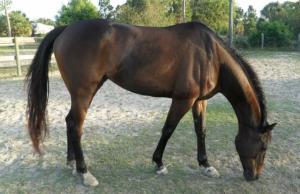
Palm Beach Equine Clinic is renowned for its exceptional care of performance sport horses of all disciplines around the world. Sometimes, the veterinarians and surgeons have the opportunity to treat the horses owned by their colleagues. This summer, Palm Beach Equine Clinic veterinary technician Megan O’Neal experienced the clinic’s surgical expertise firsthand when her rescued off the track Thoroughbred (OTTB) was diagnosed with severe spinal impingement (kissing spines).
Signs and Symptoms
O’Neal adopted Blessing, a 10-year-old mare, almost three years ago. After Blessing’s career on the track ended, she was given to Pure Thoughts Horse Rescue in Wellington, FL. Blessing had moved through a few foster homes before O’Neal gave her a forever home. Blessing had been successfully jumping three-foot courses with one of her previous foster homes. After adopting Blessing, O’Neal was jumping the mare as well, but only about two-feet high. She had plans to compete, but Blessing’s behavior changed under saddle. The mare began rearing and bolting, endangering both herself and her rider. Her attitude on ground handling turned sour as well, no longer enjoying being groomed and pinning her ears in agitation.
Identifying the Problem

With the help of Palm Beach Equine Clinic surgeon Dr. Weston Davis and the advanced imaging technology available at PBEC, O’Neal was able to pinpoint the cause of Blessing’s troubling change in behavior. The diagnosis was severe chronic back pain with dorsal spinous process impingement (kissing spine lesions). The vertebrae in her back from T16 – L1 were affected, which is the mid-section of the horse’s back, in the general region of where the back of the saddle sits.
Addressing the Problem Through Non-Surgical Treatments
The first course of action was to try several non-surgical techniques to treat Blessing’s pain. Dr. Davis tried treatments of intramuscular injections for arthritic pain and corticosteroid injections in between the spinal vertebras. A veterinary chiropractor adjusted the mare every few weeks. For almost eight months, several additional methods were tried to avoid kissing spines surgery including acupuncture, back stretches and oral muscle relaxants. In July, when the pain continued after all their efforts, O’Neal finally decided that surgery was the only option for recovery.
Kissing Spines Surgery
In the state-of-the-art hospital at Palm Beach Equine Clinic, Blessing was sedated to obtain pre-operative radiographs that map the exact site of the lesions. She was placed under general anesthesia and the surgical site was sterilely prepared. Dr. Davis made a single 20cm incision on the dorsal midline over the palpable dorsal spinous processes. Eighteen-gauge needles were inserted at regular intervals and used as radiographic markers to identify the interspinous spaces. The incision was extended through the supraspinous ligament at each site.
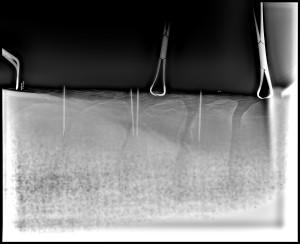
Dr. Davis used sterile surgical equipment, known as a bone rongeur, to elevate the soft tissues and resect some of the affected dorsal spinous processes (DSPs). The rongeurs, which are similar to large pliers, were used to slowly remove the edges of the overriding bone. This process frees the space between adjacent vertebrae until widened enough that the index finger of the surgeon could easily pass in the interspinous space. The site of resection was lavaged to remove any loosed tissues. Lastly, Intra-operative radiography was used as needed to confirm the location and completion of the surgery. Following confirmation, the supraspinous ligament was internally closed with absorbable sutures. The skin was closed with surgical staples and a stent was sutured in place over the incision. After several weeks of healing, the stent and staples were removed.
The kissing spines surgery was performed without complication and Blessing was provided a good prognosis. Soon after surgery, the space that was created between vertebrae filled with a non-painful, fibrous scar tissue. Blessing went home the following day after surgery. She was monitored closely at home and received routine peri-operative antibiotics (gentamicin and penicillin) and anti-inflammatories (phenylbutazone) for pain. Recently, O’Neal was given the okay from Dr. Davis to resume riding for normal exercise. O’Neal looks forward to continuing her partnership with this special mare. Thanks to Dr. Weston Davis and the team at Palm Beach Equine Clinic for their exceptional care to get Blessing back to happy and healthy!
